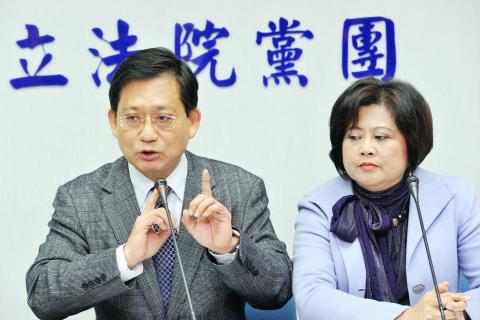Days before the Democratic Progressive Party’s (DPP) planned rally to highlight the issue of media monopolization, Chinese Nationalist Party (KMT) caucus whip Wu Yu-sheng (吳育昇) said yesterday that his caucus would support legislation to address the problem.
Wu told a press conference that the KMT caucus would agree to amendments to the Radio and Television Act (廣播電視法), the Cable Television Act (有線電視法) and the Satellite Broadcasting Act (衛星廣播電視法) proposed by DPP Legislator Yeh Yi-jin (葉宜津) to prevent media monopolies.
Wu’s comment marked a sharp change from the caucus’ previous position.

Photo: Chien Jung-fong, Taipei Times
Public concern about media monopolization has risen after the acquisition of Hong Kong-based Next Media’s four outlets in Taiwan by a consortium that includes the son of pro-China tycoon Tsai Eng-meng (蔡衍明), chairman of the Want Want China Times Group.
The acquisition still has to be approved by the Fair Trade Commission and the National Communications Commission.
The KMT caucus has previously refused to sign a petition by students and civic activists in support of legislation to guard against media monopolies, and boycotted legislative reviews of the amendments proposed by Yeh.
The amendments include a regulation that the number of channels owned by media operators and their related enterprises cannot account for more than one-tenth of all channels.
Wu said the KMT would also support the DPP’s proposal on regulations governing the electronic media and it would suggest that the print media also be covered by anti-media monopolization regulations.
Unlike the DPP, which he said had only focused on the sale of Next Media to the Want Want Group, the KMT opposes all media-monopolization cases, Wu said.
Wu said the caucus had refrained from commenting on the issue before, because it did not want to interfere in the Next Media acquisition.
The three amendments are to be reviewed at the legislature’s Transportation Committee today, with representatives from the Fair Trade Commission attending.

CHANGING LANDSCAPE: Many of the part-time programs for educators were no longer needed, as many teachers obtain a graduate degree before joining the workforce, experts said Taiwanese universities this year canceled 86 programs, Ministry of Education data showed, with educators attributing the closures to the nation’s low birthrate as well as shifting trends. Fifty-three of the shuttered programs were part-time postgraduate degree programs, about 62 percent of the total, the most in the past five years, the data showed. National Taiwan Normal University (NTNU) discontinued the most part-time master’s programs, at 16: chemistry, life science, earth science, physics, fine arts, music, special education, health promotion and health education, educational psychology and counseling, education, design, Chinese as a second language, library and information sciences, mechatronics engineering, history, physical education

DEADLOCK: As the commission is unable to forum a quorum to review license renewal applications, the channel operators are not at fault and can air past their license date The National Communications Commission (NCC) yesterday said that the Public Television Service (PTS) and 36 other television and radio broadcasters could continue airing, despite the commission’s inability to meet a quorum to review their license renewal applications. The licenses of PTS and the other channels are set to expire between this month and June. The National Communications Commission Organization Act (國家通訊傳播委員會組織法) stipulates that the commission must meet the mandated quorum of four to hold a valid meeting. The seven-member commission currently has only three commissioners. “We have informed the channel operators of the progress we have made in reviewing their license renewal applications, and

The High Prosecutors’ Office yesterday withdrew an appeal against the acquittal of a former bank manager 22 years after his death, marking Taiwan’s first instance of prosecutors rendering posthumous justice to a wrongfully convicted defendant. Chu Ching-en (諸慶恩) — formerly a manager at the Taipei branch of BNP Paribas — was in 1999 accused by Weng Mao-chung (翁茂鍾), then-president of Chia Her Industrial Co, of forging a request for a fixed deposit of US$10 million by I-Hwa Industrial Co, a subsidiary of Chia Her, which was used as collateral. Chu was ruled not guilty in the first trial, but was found guilty

Taiwan People’s Party (TPP) Chairman Huang Kuo-chang (黃國昌) yesterday appealed to the authorities to release former Taipei mayor Ko Wen-je (柯文哲) from pretrial detention amid conflicting reports about his health. The TPP at a news conference on Thursday said that Ko should be released to a hospital for treatment, adding that he has blood in his urine and had spells of pain and nausea followed by vomiting over the past three months. Hsieh Yen-yau (謝炎堯), a retired professor of internal medicine and Ko’s former teacher, said that Ko’s symptoms aligned with gallstones, kidney inflammation and potentially dangerous heart conditions. Ko, charged with